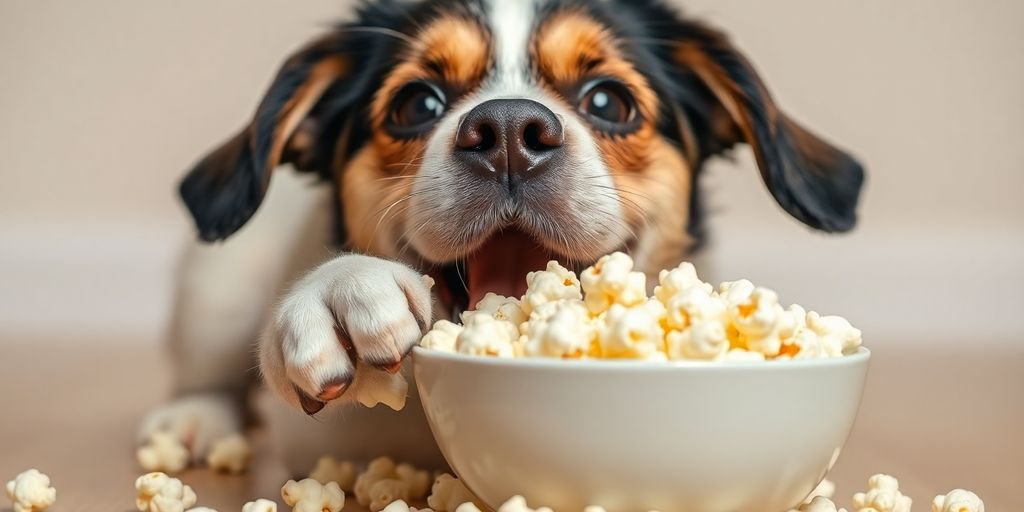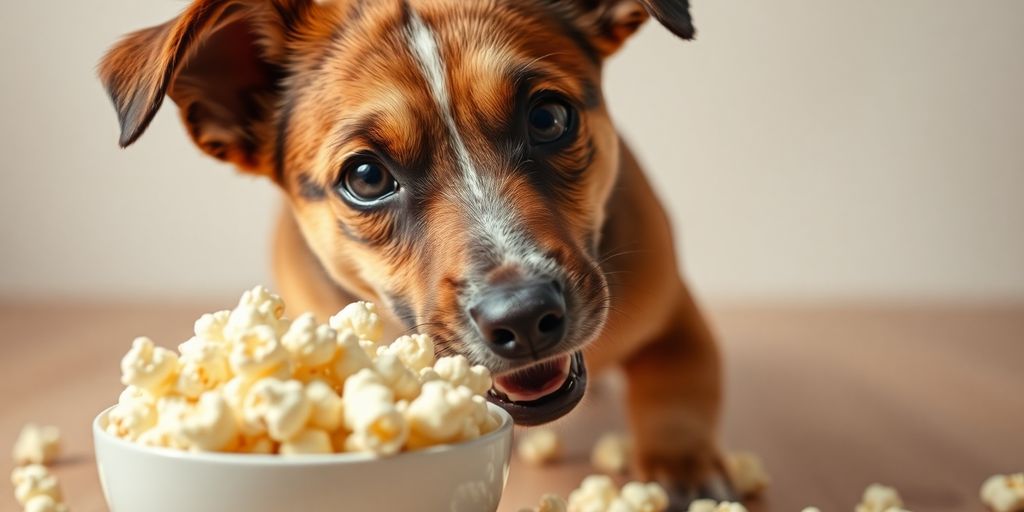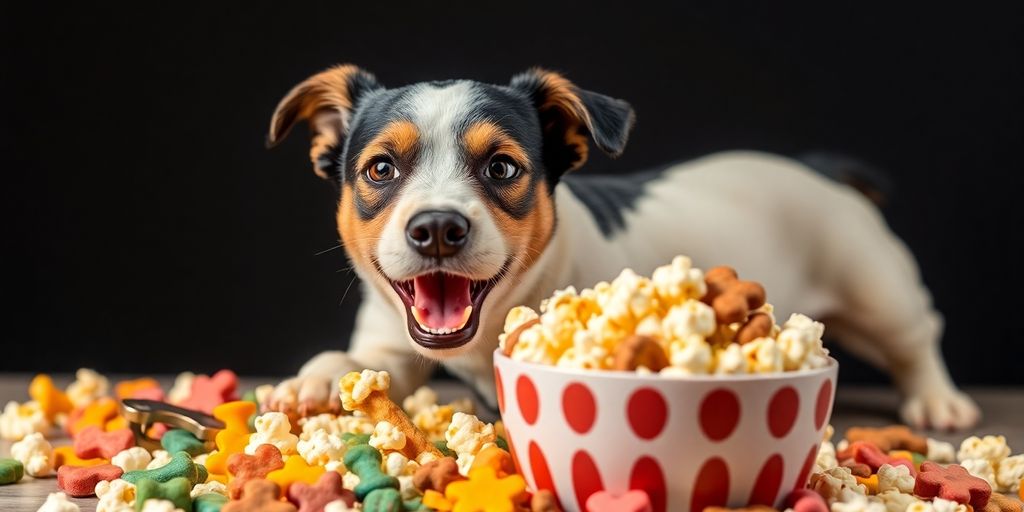When it comes to sharing snacks with our furry friends, popcorn often comes to mind. This light and crunchy treat is a favorite for many during movie nights. But is it safe for dogs? In this article, we’ll explore the ins and outs of feeding popcorn to dogs, including the benefits, risks, and proper ways to serve it. Let’s dive in to see if our pups can enjoy this popular snack alongside us.
Key Takeaways
- Dogs can eat plain, air-popped popcorn in moderation.
- Avoid flavored popcorn, especially those with butter and salt.
- Popcorn should only be a small treat, making up less than 10% of a dog’s daily calories.
- Watch for any signs of allergies or digestive issues after feeding popcorn.
- Always remove unpopped kernels as they can be choking hazards.
Can Dogs Eat Popcorn?

Understanding the Basics
Yes, dogs can eat popcorn, but only in moderation. It’s important to ensure that the popcorn is plain and air-popped. This means no added butter, salt, or other toppings that we often enjoy. Popcorn should be a rare treat, making up no more than 10% of your dog’s daily calorie intake.
Common Misconceptions
Many people think that all types of popcorn are safe for dogs. However, flavored popcorn can be harmful. For instance, buttered or salted popcorn can lead to digestive issues and obesity. Additionally, unpopped kernels can pose a choking hazard. Always remember that not all human foods are safe for dogs.
Expert Opinions
Veterinarians generally agree that plain, air-popped popcorn can be a fun snack for dogs. However, they caution against giving dogs popcorn with added seasonings. If your dog has a known allergy to corn, it’s best to avoid popcorn altogether. Always consult your vet if you’re unsure about introducing new foods into your dog’s diet.
In summary, while popcorn can be a fun treat, it should be given with caution and in small amounts.
Is Popcorn Safe for Dogs?
Potential Health Risks
While popcorn itself is not harmful to dogs, it’s important to be cautious. Plain, air-popped popcorn is the safest option. Here are some risks to consider:
- Choking hazards: Unpopped or partially popped kernels can get stuck in your dog’s throat.
- Digestive issues: Too much popcorn can upset your dog’s stomach.
- Allergies: Some dogs may have sensitivities to corn, leading to reactions like gas or diarrhea.
Safe Popcorn Preparation
To ensure your dog enjoys popcorn safely, follow these tips:
- Air-pop the popcorn: Avoid oil or butter.
- Remove unpopped kernels: Only give your dog fully popped pieces.
- Limit portions: Treat popcorn as an occasional snack, not a meal.
Signs of Allergic Reactions
Watch for these symptoms if you introduce popcorn to your dog’s diet:
- Vomiting
- Diarrhea
- Excessive gas
If you notice any of these signs, stop feeding popcorn and consult your vet.
Remember, moderation is key. Popcorn should only be a small part of your dog’s diet, not a main course!
Nutritional Value of Popcorn for Dogs
Vitamins and Minerals
Popcorn contains some essential nutrients that can be beneficial for dogs. Here are a few:
- Magnesium: Important for muscle and nerve function.
- Zinc: Supports the immune system.
- Fiber: Aids in digestion.
Caloric Content
Plain, air-popped popcorn is a low-calorie snack. Here’s a quick comparison:
| Type of Snack | Calories per 1 cup |
|---|---|
| Air-Popped Popcorn | 31 |
| Commercial Dog Treats | 50-100 |
Comparing with Other Treats
When considering snacks for your dog, popcorn can be a healthier option. Here’s how it stacks up:
- Lower in calories than many commercial treats.
- No added sugars or fats when prepared correctly.
- Can be a fun, interactive treat during movie nights.
Remember: While popcorn can be a fun treat, it should not replace a balanced diet. Always consult your vet if unsure about your dog’s diet.
How to Properly Feed Popcorn to Your Dog
Portion Control
When giving your dog popcorn, portion control is essential. Here are some guidelines to follow:
- Small Dogs: Limit to 1-2 pieces.
- Medium Dogs: A small handful is appropriate.
- Large Dogs: A few pieces, but always in moderation.
Air-Popping Techniques
The safest way to prepare popcorn for your dog is by air-popping it. Here’s how:
- Get an air popper: These machines are affordable and easy to use.
- Follow instructions: Use the recommended amount of kernels based on the machine.
- Remove unpopped kernels: Always check for any unpopped or partially popped kernels before serving.
Avoiding Harmful Additives
Make sure the popcorn is plain and free from any toppings. Here are some things to avoid:
- Butter: High in fat and can cause digestive issues.
- Salt: Can lead to dehydration and other health problems.
- Sugar: Sweetened popcorn can be harmful to dogs.
Remember, popcorn should only be an occasional treat, not a regular part of your dog’s diet. It’s important to keep their overall nutrition in mind.
By following these guidelines, you can safely share this crunchy snack with your furry friend!
Benefits of Popcorn for Dogs
Low-Calorie Snack
Popcorn can be a great low-calorie snack for dogs. When compared to many commercial dog treats, plain, air-popped popcorn has fewer calories and fat. This makes it a good option for dogs that need to maintain a healthy weight or lose a few pounds.
Weight Management
Using popcorn as an occasional treat can help dogs in a weight loss program. However, it’s important to remember that adding toppings like salt or butter can increase the calorie count significantly, which can counteract any weight loss benefits.
Bonding During Movie Nights
Sharing plain, unsalted popcorn can be a fun way to bond with your dog during movie nights. It helps your pet feel included in family activities and creates special memories together.
Popcorn can be a fun treat, but always ensure it’s plain and air-popped to keep your dog safe.
Summary of Benefits
| Benefit | Description |
|---|---|
| Low-Calorie Option | Fewer calories than many treats |
| Weight Management | Can aid in weight loss when used wisely |
| Bonding Experience | Enhances time spent together |
Risks of Feeding Popcorn to Dogs
Choking Hazards
One of the biggest dangers of giving popcorn to dogs is the risk of choking. Unpopped kernels, often called “old maids,” can be hard and pose a serious choking threat. To keep your dog safe, always check the popcorn for unpopped kernels before sharing.
Digestive Issues
Feeding your dog popcorn can lead to digestive problems. If your dog eats too much, they might experience gas, diarrhea, or an upset stomach. It’s important to monitor how much popcorn your dog consumes to avoid these issues.
Long-Term Health Concerns
Regularly feeding your dog popcorn, especially if it’s flavored or seasoned, can lead to long-term health problems. High-fat popcorn can cause pancreatitis, which is painful and can be fatal. Additionally, too much salt can lead to salt toxicity, resulting in symptoms like vomiting and seizures.
| Health Risk | Symptoms |
|---|---|
| Pancreatitis | Vomiting, lethargy, diarrhea |
| Salt Toxicity | Increased thirst, seizures |
| Choking Hazards | Difficulty breathing, coughing |
Always prioritize your dog’s health by avoiding flavored popcorn and sticking to plain, air-popped varieties. Understanding the risks can help you make better choices for your furry friend.
Can Dogs Eat Flavored Popcorn?
Impact of Butter and Salt
Feeding your dog flavored popcorn can be risky. Butter and salt are common toppings that can lead to health issues. Here are some points to consider:
- High fat content can cause digestive problems.
- Excessive salt may lead to dehydration or salt toxicity.
- Dogs can suffer from pancreatitis if they consume too much fat.
Dangers of Sweetened Popcorn
Sweetened popcorn, like caramel or chocolate varieties, is also harmful. These ingredients can cause:
- Upset stomach and gas.
- Long-term health issues like obesity and diabetes.
- Dental problems due to high sugar content.
Safe Flavor Alternatives
If you want to give your dog a treat, consider these safer options:
- Plain air-popped popcorn without any toppings.
- Small amounts of peanut butter (ensure it’s xylitol-free).
- Carrots or apple slices as crunchy snacks.
Always check the ingredients before sharing any human food with your dog. Some ingredients can be toxic and lead to serious health issues.
In summary, while plain popcorn can be a fun snack, flavored varieties often contain harmful ingredients that can affect your dog’s health. Always prioritize your pet’s safety when choosing treats!
What to Do If Your Dog Eats Too Much Popcorn

Immediate Steps to Take
If your dog has eaten too much popcorn, here are some steps to follow:
- Stay Calm: Panicking won’t help your dog. Take a deep breath.
- Check Ingredients: Look at the popcorn’s ingredients. If it contains harmful items like butter, salt, or artificial flavors, note them down.
- Monitor Symptoms: Watch for signs of distress, such as vomiting, diarrhea, or excessive thirst.
When to Call the Vet
If your dog shows any of the following symptoms, it’s time to call the vet:
- Vomiting or Diarrhea: If these symptoms persist for more than a few hours.
- Lethargy: If your dog seems unusually tired or unresponsive.
- Seizures or Tremors: These are serious signs that require immediate attention.
Preventing Future Incidents
To avoid this situation in the future, consider these tips:
- Portion Control: Only give your dog a small amount of popcorn as a treat.
- Safe Preparation: Always use plain, air-popped popcorn without any additives.
- Educate Family Members: Make sure everyone in your household knows the rules about feeding popcorn to your dog.
Remember, plain air-cooked popcorn is safe for dogs in moderation. Always prioritize your dog’s health and well-being!
Alternatives to Popcorn for Dogs

Healthy Dog Treat Options
If you’re looking for snacks that are better for your dog than popcorn, consider these options:
- Carrots: Crunchy and low in calories, they are great for dental health.
- Green Beans: A low-calorie treat that many dogs enjoy.
- Sweet Potatoes: Packed with vitamins, they can be cooked and mashed for a tasty snack.
Homemade Snack Ideas
Making your own dog treats can be fun and healthy. Here are some simple recipes:
- Peanut Butter Biscuits: Mix whole wheat flour, peanut butter, and water, then bake.
- Pumpkin Treats: Combine canned pumpkin with oats and bake until firm.
- Frozen Yogurt Pops: Mix plain yogurt with fruit and freeze in molds.
Commercial Treat Recommendations
If you prefer store-bought options, look for:
- Natural Dog Treats: Check for minimal ingredients and no artificial additives.
- Freeze-Dried Treats: These retain nutrients and are easy to store.
- Dental Chews: Help keep your dog’s teeth clean while being tasty.
Remember: While popcorn can be a fun treat, it’s not the best option for your dog. If your dog needs added fiber due to loose stools, plain canned pumpkin is a much better way to go. Always consult your vet before introducing new snacks to your dog’s diet.
Understanding Dog Food Allergies
Common Allergens
Like humans, dogs can have food allergies. While popcorn is not a common allergen, it’s still wise to be careful when adding new foods to your dog’s diet. Here are some common allergens:
- Beef
- Dairy
- Wheat
- Chicken
- Eggs
Symptoms to Watch For
If your dog has a food allergy, you might notice some signs. Pay attention to these symptoms:
- Itching and Skin Irritation: Excessive scratching or hives can indicate an allergic reaction.
- Digestive Issues: Vomiting or diarrhea may occur if your dog is intolerant to a food.
- Respiratory Distress: In rare cases, allergies can cause coughing or sneezing.
Managing Allergies in Dogs
If you suspect your dog has a food allergy, here are steps to take:
- Consult a Vet: Always talk to a veterinarian for proper diagnosis.
- Elimination Diet: Remove suspected allergens from your dog’s diet and reintroduce them one at a time.
- Monitor Symptoms: Keep track of any changes in your dog’s behavior or health.
Remember, early detection is key! If you notice any signs of allergies, it’s important to act quickly to ensure your dog’s health.
Highlighted Information
- Common Allergens: Beef, Dairy, Wheat
- Symptoms: Itching, Digestive Issues, Respiratory Distress
- Management Steps: Consult a Vet, Elimination Diet, Monitor Symptoms
By understanding dog food allergies, you can help keep your furry friend safe and healthy!
Frequently Asked Questions About Dogs and Popcorn
Can Small Dogs Eat Popcorn?
Yes, small dogs can eat popcorn, but it should be in very limited amounts. Always ensure that the popcorn is plain and air-popped. A few pieces are enough for a small dog, and it should never replace their regular food.
Is Microwave Popcorn Safe?
Microwave popcorn is not safe for dogs. It often contains butter, salt, and other additives that can be harmful. Always opt for plain, air-popped popcorn instead.
How Much Popcorn is Too Much?
The amount of popcorn should be minimal. A good rule of thumb is that treats, including popcorn, should make up no more than 10% of your dog’s daily calorie intake. Here’s a quick guide:
| Dog Size | Safe Popcorn Amount |
|---|---|
| Small (up to 20 lbs) | 1-2 pieces |
| Medium (20-50 lbs) | 3-5 pieces |
| Large (50+ lbs) | 6-10 pieces |
Remember: Always monitor your dog after giving them popcorn for the first time to check for any adverse reactions.
Feeding popcorn can be a fun treat, but it’s essential to do it safely and in moderation. Keep an eye on your dog for any signs of discomfort after eating popcorn, and consult your vet if you have concerns.
Final Thoughts on Dogs and Popcorn
In conclusion, while dogs can enjoy popcorn as an occasional treat, it’s important to keep it plain and air-popped. Remember, moderation is key! Too much popcorn, especially if it’s seasoned, can lead to health issues for your furry friend. Always check for unpopped kernels, as they can be a choking hazard. If your dog shows any signs of allergies or digestive problems after eating popcorn, it’s best to avoid giving it to them in the future. Enjoy your movie nights, but make sure your pup stays safe!










